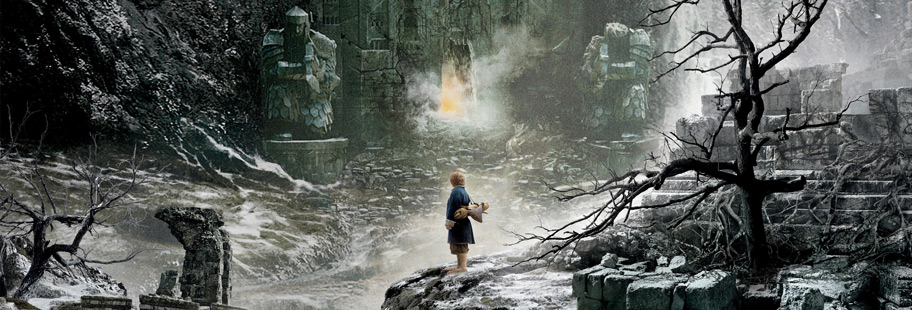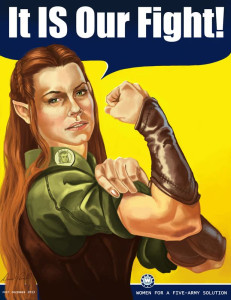
If there’s one takeaway from the first film in Peter Jackson’s film adaptation of The Hobbit, it’s that the writer/director’s tinkering with Tolkien’s lore, ostensibly for the sake of making a more bloated exciting theatre-going experience, was less than successful. The additions of Azog, Radagast’s plight against the Necromancer, the absurdity in the hall of the Goblin King, and anything to do with the White Council were unnecessary to Bilbo’s story (which, at the end of the day, is what The Hobbit should be about), and raised concerns about the decision to extend the series of films from two volumes into a trilogy.
On the eve of the release of the second film, The Desolation of Smaug, Peter Jackson recently discussed the decision to add and expand on the characters of three elves, including fan favourite Legolas, played again by Orlando Bloom, and newcomer Tauriel, played by Evangeline Lily. “People always ask about Evangeline’s character Tauriel and why we felt the need to create her,” Jackson said, via /Film. “But in The Hobbit novel, [the dwarves] are captured by the elves and they escape in the barrels. And it’s a memorable part of the book but the Elf King is not even named. He doesn’t have a name. And it was only later on that Tolkien decided it should be Thranduil and he also decided he should have a son when Lord of the Rings was written 18-19 years later. He created the character of the son of the king.

So you’ve got material there but you can’t have a scene in a film that’s a memorable scene with just one person as the Elf. We wanted three Elven characters. That’s the thing too, to create characters and have conflict with each other and they have different agendas. Thranduil, Legolas and Tauriel are all on different flight paths which makes it much more interesting ability for Fran and I to tell the narrative through their eyes.”
Jackson’s reasoning is sound. Raising the viewer’s engagement and emotional attachment to the film by creating new named and recognizable characters is admirable and probably for the best of the film. That being said, Bilbo and the dwarf’s experience with the wood elves is one of captor/captives/burgular, and the mysterious, nameless elves are part of the fun. Bilbo has to navigate their kingdom without the ability to interact or communicate with them directly.
More concerning, however, is his suggestion that Thranduil, Legolas and Tauriel all have ‘different agendas.’ Getting back to the idea that these films should be about Bilbo’s journey, I’m not terribly certain that I care what the elves are doing from a political standpoint. Jackson might use the screen time and ‘conflict’ between these characters to better describe the tension between the elves and the dwarves, casting further speculation on the elf army’s involvement at the end of the novel, then fine and good. Adding storylines about brooding elf princes and romance? Save it for the extended edition, please.
One valid criticism of The Hobbit (and most of Tolkien’s work in general, to be frank) is its lack of any female characters. In fact, I can’t think of one woman in the entire book who has a line of dialogue. Despite the potential pitfalls (like an already confirmed romantic storyline), the addition of an engaging and important female character (so, you know, fans have a new type of hero to cheer for beyond the brooding dwarf, the handsome dwarf, the wizard, and the hobbit), is a positive addition from at least one perspective.
Early reviews of the film have been favourable, sitting at a respectable 79% on Rotten Tomatoes. “The Desolation of Smaug” is quite nearly a great Hobbit film,” says Jonathan Lack of We Got This Covered, “filled with wondrous invention, genuine pathos, and many great performances.” And Tim Grierson of Deadspin almost agrees. He says, “This is a perfectly solid, diverting film. So was the last one. Go in with measured expectations and you’ll have nothing to fear — or be disappointed by.” And, that, at the end of the day, is all there is. With tempered expectations, and understanding that the Tolkien fan in me will have to take a back seat to the Jackson fan, I’m curious and eager for the lights to go down and the curtain to raise on The Desolation of Smaug.

I’m a fan of both Jackson’s and Tolkien’s works too. So I’m perfectly capable of enjoying both without worrying that the latter might somehow eclipse the former. Still… the sheer volume of unnecessary shit he’s including is a bit disconcerting to me at times. “There (and taking the kitchen sink with me) and Back Again.”
Then I remember to let it go. ;)
I like Jackson too. But the one thing that I have to keep letting go off is that “The Hobbit” is not a prequel to “Lord of the Rings” it’s a stand alone book that made “Lord of the Rings” happen.
Jackson’s additions were the worst things in the 3 Lord of the Rings films and they were the worst things in the first Hobbit film. Who is he to introduce new characters and decide their motivations, does he somehow think that he is on the same level as Tolkien?
The changes that he’s made to the Hobbit are primarily to add to his and Warner Brothers bank balance, to somehow think that they add to or improve the story is just delusion.
[…] Comment: Peter Jackson and His New Elves, posted by A Dribble of Ink […]
[…] Comment: Peter Jackson and His New Elves, posted by A Dribble of Ink […]
Worth noting is that staying true to The Hobbit in tone and storyline would have been a disaster from a filmmaking standpoint. LOTR is an adult story written for adults ; the hobbit was written for children. LOTR didn’t need anything to be adapted into film; having Bilbo run around calling spiders tomnoddy and attercop would just be insulting to the audience. The essence of Bilbos story is in here; Jackson is just expanding on the legendarium to make a better story. And frankly, the greed and redemption of Thorin is a good story too, and deserves the screen time. The same as Aragorn’s maturation into a king was mostly an invention of Jackson, and yet one of the driving plot points of LOTR